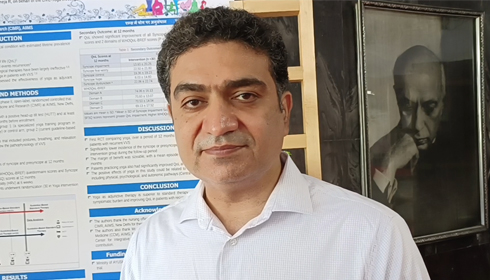
Oil dripping therapy with standard care effective in chronic insomnia: AIIMS study
A study carried out by Delhi-AIIMS’ Center for Integrative Medicine and Research (CIMR) has revealed that oil dripping therapy with standard care is effective in improving sleep quality in a case of treatment-resistant chronic insomnia.
Prof Gautam Sharma, In-Charge of CIMR and Professor in the Department of Cardiology, said, “We have recently published a study, which shown that integration of Shirodhara (oil dripping therapy) as add-on therapy with standard care is effective in improving sleep quality in a case of treatment-resistant chronic insomnia.”
Prof Sharma pointed out that additionally, traditional Indian herbs (TIH) and dietary items, e.g., Ashwagandha, Brahmi, Sunnishnaka, sugarcane, grape, jaggery and buffalo milk, which have been used since ancient times for inducing sleep and relaxation are supported by recent research evidence.
“Additionally there are other therapeutic modalities such as Abhyanga (whole body massage), Pada-Abhyanga (Foot massage), Snana (medicated bath) which are also recommended for improving sleep, relaxation, and overall well being,” Prof Sharma added.
“There is a growing public interest in Ayurveda, which provides a range of safe and affordable sleep solutions,” Prof Sharma said.
Sleep requirements vary with age and individual, with 12-18 hours in infancy and gradually decreasing to 7-8 hours by adulthood. Uninterrupted sleep with a regular bedtime resulted in feeling refreshed in the morning and throughout the day, which is generally considered as good sleep.
Apart from adequate sleep duration, good sleep architecture, including the length and depth of different sleep stages, is also important for good quality sleep.
Chronic sleep deprivation or poor sleep quality is difficult to recognise because symptoms are non-specific, which include difficulty getting out of bed in the morning, daytime fatigue, irritable mood and poor performance at work. All of this is mostly considered as an individual’s personality rather than health related problems.
Research has established that adequate sleep is for physical and mental health, it improves focus, memory, learning, metabolism, immunity and reduces inflammation. Chronic sleep deprivation is a known risk factor for diabetes, obesity, high blood pressure, stroke, heart attacks, a compromised immune system, and mental disorders.
Additionally, people who sleep less than 5 hours per night had a 56 per cent higher risk of having a heart attack than who sleeps seven hours. Inadequate sleep syndrome is the most common sleep disorder and it has been estimated that 17-18 hours of sleep deprivation lead to a decrease in performance equivalent to alcohol intoxication, both have been associated with fatal road traffic accidents.
Ayurveda (Traditional Indian Medicine) believes that sleep naturally occurs in synchronization with the natural light and dark cycle and considers sleep one of the three pillars of life, along with nutrition and regulation of the senses.
Based on this it emphasizes the adopting healthy sleep regimens such as sleeping early and waking up at Brahma muhurta (almost an hour prior to sunrise), and no daytime naps except for very young children.
Additionally, a sleeping environment like a comfortable bed, calm and relaxing ambience, pleasant aroma, and listening to agreeable music are the factors which indirectly promote sleep is also advisable.
Intriguingly, the traditional sleep recommendations are consistent with the contemporary recommendations for sleep hygiene.